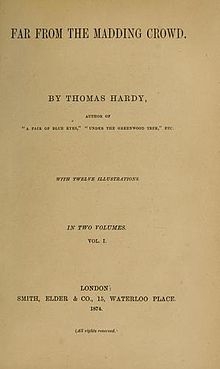Our website is made possible by displaying online advertisements to our visitors.
Please consider supporting us by disabling your ad blocker.
Far from the Madding Crowd
 The title page from an 1874 first edition of Far from the Madding Crowd. | |
| Author | Thomas Hardy |
|---|---|
| Language | English |
| Genre | Novel |
| Publisher | Cornhill Magazine |
Publication date | 23 November 1874 |
| Publication place | England |
| Pages | 464 pages (Harper & Brothers edition, 1912) |
| Preceded by | A Pair of Blue Eyes |
| Followed by | The Hand of Ethelberta |
Far from the Madding Crowd is the fourth published novel by English author Thomas Hardy; and his first major literary success. It was published on 23 November 1874. It originally appeared anonymously as a monthly serial in Cornhill Magazine, where it gained a wide readership.
The novel is set in Thomas Hardy's Wessex in rural southwest England, as had been his earlier Under the Greenwood Tree. It deals in themes of love, honour and betrayal, against a backdrop of the seemingly idyllic, but often harsh, realities of a farming community in Victorian England. It describes the life and relationships of Bathsheba Everdene with her lonely neighbour William Boldwood, the faithful shepherd Gabriel Oak, and the thriftless soldier Sergeant Troy.
On publication, critical notices were plentiful and mostly positive. Hardy revised the text extensively for the 1895 edition and made further changes for the 1901 edition.[1]
The novel has an enduring legacy. In 2003, the novel was listed at number 48 on the BBC's survey The Big Read,[2] while in 2007, it was ranked 10th on The Guardian's list of greatest love stories of all time.[3] The novel has also been dramatised several times, notably in the Oscar-nominated 1967 film directed by John Schlesinger.
- ^ Page, Norman, ed. (2000). Oxford Reader's Companion to Hardy. Oxford: Oxford University Press. pp. 130–132. ISBN 978-0-19-860074-9.
- ^ "BBC – The Big Read". BBC. April 2003, Retrieved 31 October 2012
- ^ Wainwright, Martin (10 August 2007). "Emily Brontë hits the heights in poll to find greatest love story". The Guardian. London. Retrieved 29 August 2009.
Previous Page Next Page
بعيدا عن صخب الناس Arabic Çılğın izdihamdan uzaq AZ Далеч от безумната тълпа Bulgarian Am grünen Rand der Welt German Lejos del mundanal ruido Spanish به دور از مردم شوریده FA Loin de la foule déchaînée (roman) French Fier fan Alle Drokte FY הרחק מהמון מתהולל HE Távol a világ zajától (regény) Hungarian


